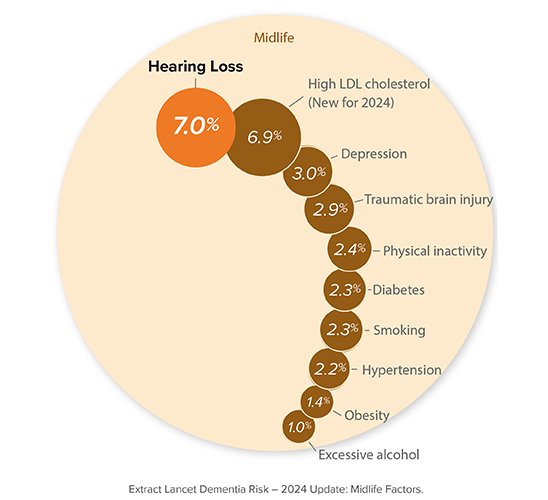Find out more about Oticon Zeal

Dementia and hearing loss
Care for your hearing
Dementia can feel like a difficult subject to talk about, but many of us will be affected by it at some point in our lives, either directly or indirectly.
But there are steps you can take in mid-life to reduce your risk of developing dementia later on. And one of the most impactful changes is to maintain a healthy and engaged lifestyle. Treating hearing loss enables you to stay connected to your loved ones and helps you to keep being you.
A great place to start is with our online hearing test. It’s free, only takes about five minutes and we’ll email you your results straight away. Although it can’t replace a full, thorough hearing test with one of our hearing care experts, it will give you a general idea of how well you can hear.
There are ways to reduce the risk of dementia
A new report by The Lancet, one of the world’s leading medical journals, was released on 31 July, 2024.5
These lifestyle factors can be changed to reduce your risk for developing dementia. These factors are:

Of these 14 risk factors, hearing loss in mid-life is one of the most impactful.
Why choose Hidden Hearing?
All our staff have been encouraged to train to become ‘Dementia Friends’ – the biggest-ever initiative to transform how the nation thinks, acts and talks about dementia.
According to Alzheimer’s Society, “Becoming a Dementia Friend simply means finding out more about how dementia affects a person – and then, armed with this understanding, doing small everyday things that help.”

The incidence of dementia is associated with the level of hearing loss.
- Mild hearing loss doubles the risk of dementia
- Moderate hearing loss triples the risk of dementia
- Severe hearing loss increases the risk of dementia of up to five times that of those who don't have a loss.7
How is hearing loss linked to dementia?
Although the connection is not completely understood, there are a few possibilities that could explain the link.
It could be that when we struggle to hear, we fill in the gaps – but this puts extra strain on our brains at the expense of other faculties, like thinking or memory.
It’s also possible that the social isolation caused by hearing loss means that people who struggle to hear don’t keep their brain as active or as engaged as those with busy social lives.
And it’s also been suggested that hearing loss may even cause an ageing brain to shrink more quickly.8
According to John Hopkins University, “all three theories suggest that treating hearing loss with something as simple as using a hearing aid could directly modify or affect those pathways and reduce the risk of cognitive decline.”
The Lancet study states that, “The observational evidence of the benefits of hearing aids for dementia risk is increasing” meaning that although further research is needed, there is increasing evidence that hearing aids could help prevent cognitive decline.
Research into whether hearing aid use can help reduce the risk is ongoing6, but one thing is clear: taking action on your hearing loss is risk free. You have absolutely nothing to lose by getting your hearing checked and any hearing loss treated.
Take control of your hearing health
Staying on top of your hearing health doesn’t need to be hard work. It all starts with a free hearing test at your local hearing clinic. Click the button below to book your test now, or click here to find out exactly what happens at a hearing test.

Sources
1 Health Checks & Priorities - A Survey of Attitudes and Experiences in Great Britain’ a survey of 3,000 UK adults commissioned by Hidden Hearing in July 2024.
2 Hearing Aids May Slow Dementia Onset | Johns Hopkins | Bloomberg School of Public Health (jhu.edu)
3 Local dementia statistics | Alzheimer's Society (alzheimers.org.uk)
4 Health Checks & Priorities - A Survey of Attitudes and Experiences in Great Britain’ a survey of 3,000 UK adults commissioned by Hidden Hearing in July 2024.
5 G. Livingston, J. Huntley, K. Y. Liu et al., ‘Dementia prevention, intervention, and care: 2024 report of the Lancet standing Commission - The Lancet’
6 For full T&Cs, visit hiddenhearing.co.uk/terms-and-conditions/as
7 Hearing Loss and the Dementia Connection | Johns Hopkins | Bloomberg School of Public Health (jhu.edu)
8 The Hidden Risks of Hearing Loss | Johns Hopkins Medicine



